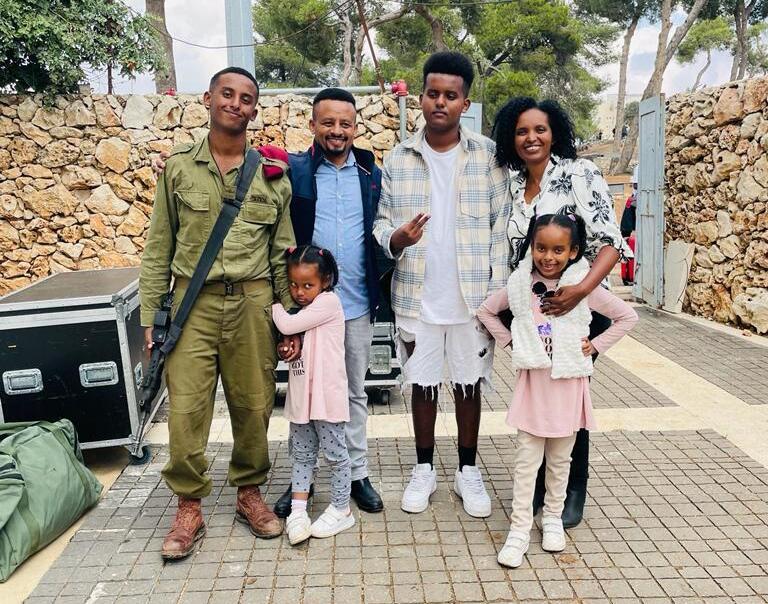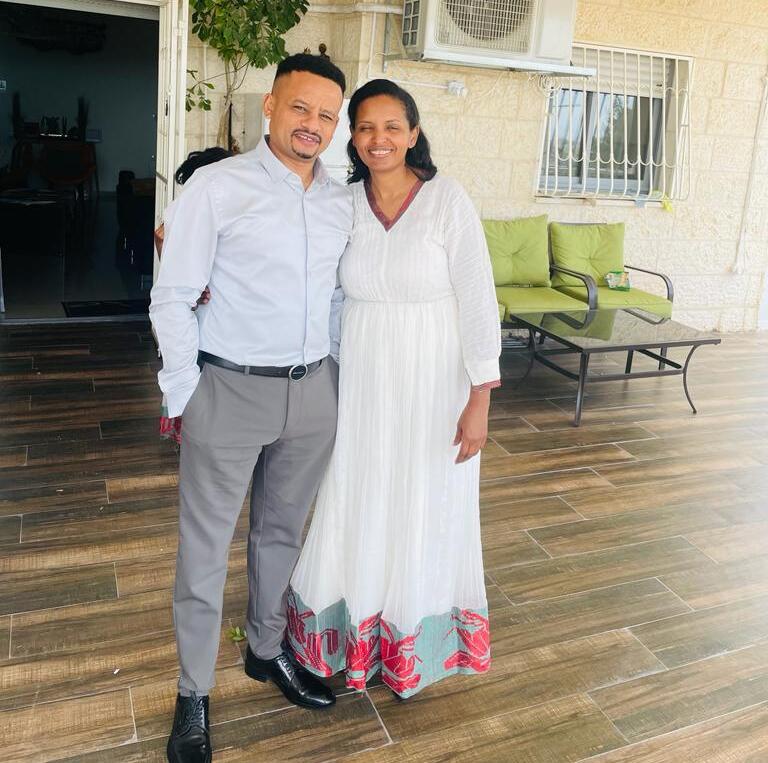Getting your Trinity Audio player ready...
Genat Alemu, 45, the head of the Methods, Processes, and Public Inquiries Unit at the Population and Immigration Authority, and an advisor for the promotion of women to the authority’s director-general; and Yoni Alemu, 47, a light rail conductor, made Aliyah from Ethiopia and are now living in Jerusalem with their four children.

Where are you from in Ethiopia?
"Addis Ababa. Genat's family is originally from Gondar."
When did you make Aliyah?
"Genat arrived in 1998, 25 years ago. Yoni came to Israel in 2001, 22 years ago."
What made you decide to make Aliyah?
"It was a family decision, driven by a love for Israel and a desire to be with the rest of the Jewish people,” Genat says. “My family always talked about migrating to Israel and Jerusalem one day. I arrived with my parents when I was 20, and I and my other 5 siblings all made Aliyah. After we first arrived, we spent two years in Givat Hamatos, and then each of us left and found their own path."
"I came alone out of love for Israel,” Yoni says. “I was 26. They always spoke at home about Israel, the Holy Land. My family supported my decision. I made Aliyah and arrived in Jerusalem."
What do you love most about Israel?
"I love the fact you can meet nice people wherever you go,” Genat says cheerfully. “When we first arrived, there were many good people who helped us. I love the camaraderie among people, even if you're complete strangers, they’ll try to help you with whatever they can. I think this is something you can only find in Israel.”
"I love the kindness of Israelis, their willingness to help each other and the optimism,” Yoni says. “Despite all the hardships, Israelis are happy. It's something I didn't experience in Ethiopia, but I see it here."
What is still challenging for you to adapt to in Israel?
"Israeli aggressiveness and impatience,” Yoni laments. “I'm not used to it, and it can be challenging at times. People are also impatient on the roads, which can be tough."
Genat adds, "People sometimes raise their eyebrows when they see people of Ethiopian descent in higher positions. They don't expect Ethiopians to succeed in Israel."
Do you feel that your situation in Israel is better than in Ethiopia?
"Clearly, without a doubt,” Genat exclaims. “There are many more opportunities available in Israel than in Ethiopia. I completed three degrees here. There are great chances and anyone can succeed if they want to."
"Of course,” Yoni agrees. “Things are better economically, medically and security-wise, and education is much better. We have the IDF, which is something unique to Israel. I sleep well at night knowing I’m safe. I felt less safe in Ethiopia. I left after the regime change; after war broke out and affected us. Despite terror attacks, I feel very calm in Israel.”
What’s your favorite place in Israel?
"Jerusalem,” Genat answers. “I don't know if people who come from abroad understand the magnitude of this place. It's the city of our ancestors, a holy city. Especially around the Western Wall.”
Yoni also chooses Jerusalem. "If I have to pick a specific place in Jerusalem, it’d be Machane Yehuda Market. I love being there on Fridays, sitting and watching the smiles on people's faces."
"There are many more opportunities available in Israel than in Ethiopia. I completed three degrees here. There are great chances and anyone can succeed if they want to"
At what moment did you truly feel like an Israeli?
"When my son enlisted in the IDF,” Genat recounts. “I made Aliyah at 20, and I didn't have the opportunity to serve, but when our son enlisted, I vicariously felt I was truly Israeli through him. Seeing him serving and contributing to Israel, especially as a soldier in a combat unit, completes this cycle for me."
"I felt Israeli from the first day I arrived. My heart has connected to this country,” Yoni says.
Do you have any advice for new Olim arriving in Israel?
"New Olim need to work much harder than native Israelis, but if they work hard, they should know that they’ll succeed. I encourage them not to give up. Strive to integrate into Israeli society, and avoid feelings of victimhood. Work hard. It's important to know that there are many good Israelis who are willing to help," Genat concludes.
"The most important thing to know in order to integrate into Israel is to study and make an effort. Learn Hebrew, take specialized courses and acquire a profession. If you do that, there's no reason you won’t succeed," Yoni adds.





